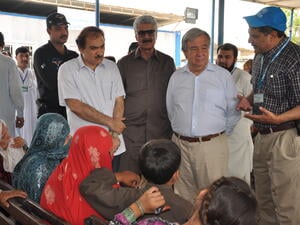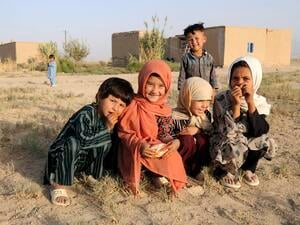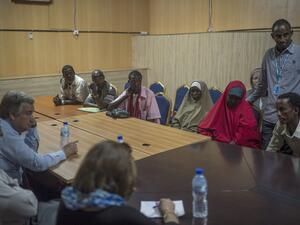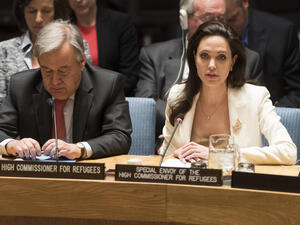Europe Must Uphold its Values, António Guterres and Cecilia Malmström
Europe Must Uphold its Values, António Guterres and Cecilia Malmström
Note: this OpEd ran in different languages in a number of European papers on the occasion of the 60th anniversary of the 1951 Refugee Convention on 28 July 2011.
Sixty years after the signature of the Geneva Convention on Refugees, which has helped millions of men, women and children fleeing persecution, wars and torture, to secure protection and the prospect of a brighter future, the world remains scarred by conflicts new and old. Since the spring, we have seen more than a million people leave everything behind and flee the war in Libya. Although only a relatively small number have come to Europe, the images have shocked us all: men, women and children putting their lives at risk in often unseaworthy boats, trying to cross the Mediterranean in rapidly variable weather, an unknown but large number drowning in the attempt.
Europe owes it to these people, to all refugees and to itself to uphold the values of the 1951 Refugee Convention. The Convention emerged from the strong "never again" sentiment following World War II. It provided a clear legal framework for the protection of individuals fleeing persecution. The values enshrined in the Refugee Convention and in other international instruments adopted at approximately the same time, such as the Universal Declaration of Human Rights and the Geneva Conventions on the Law of Armed Conflict, are part of the identity of Europe and have been built into the structure of the European Union. Indeed, the EU itself was born of the desire to prevent the misery of war. Human rights and refugee protection are a part of its essence.
For four of the six decades that the Refugee Convention has been in place, the main beneficiaries of refugee protection were Europeans themselves, many of them now EU citizens. We all remember the wars in the Balkans and the refugees who needed protection only a few years ago. And, of course, the reason the United Nations High Commissioner for Refugees was set up in the first place was to help the hundreds of thousands of people still uprooted and destitute half a decade after the end of World War II. Political leaders all over Europe have long encouraged the development of democratic structures as the best guarantor of rights and opportunity for peoples throughout the world.
With what is happening on the southern shores of the Mediterranean, there is an opportunity to translate exhortations into action. The governments and people of Tunisia and Egypt have shown remarkable generosity and hospitality in hosting hundreds of thousands of people fleeing Libya. The EU has acknowledged the importance of demonstrating solidarity with countries in North Africa but could do much more.
Debates in member states tend to focus on the challenges that people leaving Libya may pose rather than the potential they represent to enrich our societies. The discussion often fails too to take account of the relative distribution of asylum-seekers and refugees around the world. The 27 countries of the EU received a total of just over 243,000 asylum applications last year. That represents about 29 per cent of the total worldwide. South Africa alone received about 180,000. In terms of the individuals recognised as refugees, about four fifths reside in the developing world. EU countries granted refugee status or another form of protection to about 74,000 people last year. By contrast, there are about 400,000 refugees in a single set of camps in Dadaab, Kenya, a number that grows by an estimated 1,300 to 1,500 people a day in light of the crisis in Somalia.
The EU certainly has the capacity to enlarge its share of responsibility for refugees and asylum seekers. At present, a truly common asylum system remains elusive as significant differences persist among member states in their reception and treatment of asylum-seekers. In 2010, asylum seekers from Iraq had a 49 per cent likelihood of obtaining international protection in France, a 56 per cent chance in Germany and a chance of under two per cent in Greece or Ireland.
A system that treats asylum claims so disparately is far from complete. The 60th anniversary of the Refugee Convention, we hope, will give impetus to the establishment of a true common European asylum system. The new European Asylum Support Office, inaugurated in Malta last month, is expected to contribute meaningfully in this regard, both between EU countries and between the Union and countries outside the EU.
Europe could also do much more in terms of resettlement. Resettlement is the process through which refugees are permanently relocated, usually from less developed countries, to new countries of permanent residence, most often in the developed world. Refugees are resettled when they cannot safely remain in their countries of first asylum or have no prospect of finding a lasting solution there. The 6,000-odd resettlement places Europe presently makes available represent about 7.5 per cent of available places worldwide. Acceleration of an EU-wide resettlement programme and a more robust intake, including by offering additional places and expediting departure procedures for those awaiting resettlement from the Tunisian and Egyptian border areas with Libya, would provide welcome evidence of an increased commitment to international solidarity and responsibility sharing.
As we celebrate the 60th anniversary of the Refugee Convention today, let us recognise how central it remains to the values of Europe. With new crises emerging and old ones unresolved, let us also commit to do more to protect and find solutions for the displaced and persecuted. Europe has a historically irreplaceable and still crucial role to play. Let us make sure we play it.
Cecilia Malmström is the European Commissioner for Home Affairs. António Guterres is the United Nations High Commissioner for Refugees and former Prime Minister of Portugal.







